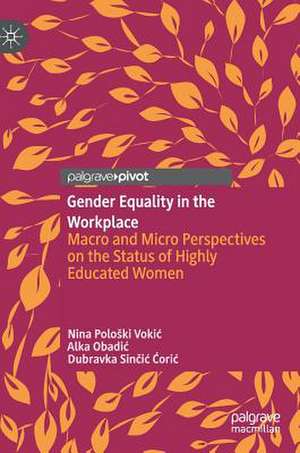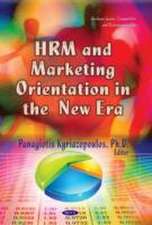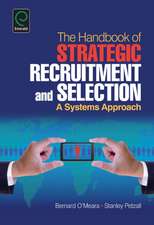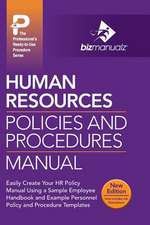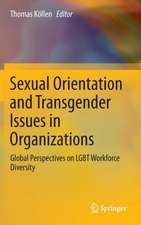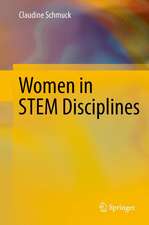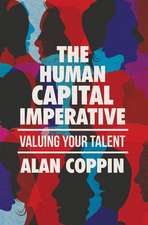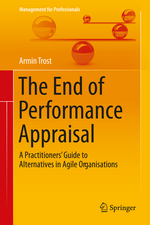Gender Equality in the Workplace: Macro and Micro Perspectives on the Status of Highly Educated Women
Autor Nina Pološki Vokić, Alka Obadić, Dubravka Sinčić Ćorić Cuvânt înainte de Kolinda Grabar-Kitarovićen Limba Engleză Hardback – 10 iul 2019
Preț: 446.37 lei
Nou
Puncte Express: 670
Preț estimativ în valută:
85.45€ • 87.88$ • 70.89£
85.45€ • 87.88$ • 70.89£
Carte tipărită la comandă
Livrare economică 19 februarie-05 martie
Preluare comenzi: 021 569.72.76
Specificații
ISBN-13: 9783030188603
ISBN-10: 3030188604
Pagini: 185
Ilustrații: XXI, 187 p. 29 illus.
Dimensiuni: 148 x 210 x 22 mm
Greutate: 0.4 kg
Ediția:1st ed. 2019
Editura: Springer International Publishing
Colecția Palgrave Pivot
Locul publicării:Cham, Switzerland
ISBN-10: 3030188604
Pagini: 185
Ilustrații: XXI, 187 p. 29 illus.
Dimensiuni: 148 x 210 x 22 mm
Greutate: 0.4 kg
Ediția:1st ed. 2019
Editura: Springer International Publishing
Colecția Palgrave Pivot
Locul publicării:Cham, Switzerland
Cuprins
Chapter 1. Introduction.- 2. Gender Inequality: General Areas of Gender Segregation.- 3. Gender Inequality: Specific Areas of Gender Segregation.- 4. Consequences of Gender Segregation in the Contemporary Work Environment: Barriers to Women's Employment, Development and Advancement.- 5. Gender Equality Initiatives and their Benefits.- 6. (In)Equality of Highly Educated Women.- 7. Macro Perspectives on the Equality of Highly Educated Women: Focus on EU-28.- 8. Micro Perspectives on the Equality of Highly Educated Women: Their Perceptions of Career Development.- 9. Conclusion: Highly Educated Women and the Future of Equality.
Notă biografică
Nina Pološki Vokić is Professor of Management and HRM in the Faculty of Economics and Business at the University of Zagreb, Croatia. She is also a Guest Professor at WU Vienna University of Economics and Business, Austria, and has written and edited a number of books, chapters and journal articles.
Alka Obadić is Professor of Economics in the Faculty of Economics and Business at the University of Zagreb, Croatia, and Visiting Professor at the University of Ljubljana, Slovenia. Teaching and researching macroeconomics, the Croatian economy, employment policies, clusters and competitiveness, Alka is co-author of a number of university textbooks, monographs and journal articles.
Dubravka Sinčić Ćorić is Professor of Marketing, Marketing Management and Business-to-Business Marketing in the Faculty of Economics and Business at the University of Zagreb, Croatia. She has co-authored 3 textbooks and over 50 articles and papers.
Alka Obadić is Professor of Economics in the Faculty of Economics and Business at the University of Zagreb, Croatia, and Visiting Professor at the University of Ljubljana, Slovenia. Teaching and researching macroeconomics, the Croatian economy, employment policies, clusters and competitiveness, Alka is co-author of a number of university textbooks, monographs and journal articles.
Dubravka Sinčić Ćorić is Professor of Marketing, Marketing Management and Business-to-Business Marketing in the Faculty of Economics and Business at the University of Zagreb, Croatia. She has co-authored 3 textbooks and over 50 articles and papers.
Textul de pe ultima copertă
“My message to all women and girls is – have faith and believe in yourselves – in your value, your strength, your knowledge and your capabilities. I thank the authors for this women’s empowerment book, and recommend it to everyone who is interested in learning more about gender equality and women’s rights.”
—Kolinda Grabar-Kitarović, President of the Republic of Croatia and Chair of Council of Women World Leaders
Focusing on the status of highly educated women in the workplace, this book examines how a particular demographic and workforce group can help to close the gender pay gap worldwide. Despite contributing to the substantial fall of differentials between men and women on a global scale, the demographic of highly educated women is rarely explored in terms of its impact on gender equality. Drawing on both macro- and micro-level perspectives, this book analyses the theory behind gender segregation and initiatives for women’s inclusion, as well asoffering empirical accounts of women’s experiences in the workplace. The authors have written a timely and valuable book that will appeal to both researchers of diversity and inclusion in the workplace, but also policy-makers and practitioners involved in HR.
—Kolinda Grabar-Kitarović, President of the Republic of Croatia and Chair of Council of Women World Leaders
Focusing on the status of highly educated women in the workplace, this book examines how a particular demographic and workforce group can help to close the gender pay gap worldwide. Despite contributing to the substantial fall of differentials between men and women on a global scale, the demographic of highly educated women is rarely explored in terms of its impact on gender equality. Drawing on both macro- and micro-level perspectives, this book analyses the theory behind gender segregation and initiatives for women’s inclusion, as well asoffering empirical accounts of women’s experiences in the workplace. The authors have written a timely and valuable book that will appeal to both researchers of diversity and inclusion in the workplace, but also policy-makers and practitioners involved in HR.
Caracteristici
Offers a systematic overview of general and specific gender segregation areas Provides policy recommendations for women's equality initiatives, as well as real-life success stories Includes analysis of personal, organizational and social factors that influence highly educated women’s career development
